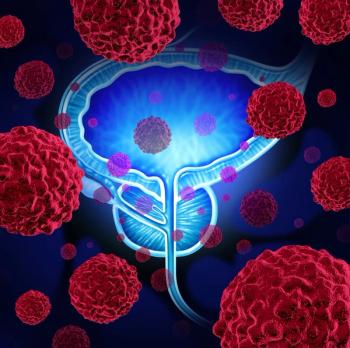
Data presented at 2021 ESMO show that nivolumab plus chemotherapy improves survival outcomes in certain patients with frontline gastrointestinal cancers, but not nivolumab plus ipilimumab.

Your AI-Trained Oncology Knowledge Connection!


Data presented at 2021 ESMO show that nivolumab plus chemotherapy improves survival outcomes in certain patients with frontline gastrointestinal cancers, but not nivolumab plus ipilimumab.

Certain patients with metastatic castration-resistant prostate cancer may have favorable outcomes after receiving nivolumab plus rucaparib.

Data from the KRYSTAL-1 trial show promise of adagrasib as monotherapy and in combination with other standard agents for colorectal cancer.

Durable objective responses coupled with an acceptable safety profile were reported for sabizabulin in patients with metastatic castration-resistant prostate cancer at 2021 ESMO.

Results of the phase 2 SAKK 08/16 trial indicate a benefit to switching to darolutamide maintenance following prior therapies for metastatic castration-resistant prostate cancer.

The combination of abiraterone acetate and prednisolone plus androgen deprivation therapy showed a statistically significant improvement in survival outcomes for patients with nonmetastatic high-risk prostate cancer.

Data from the phase 3 MONALEESA-2 trial demonstrate significant benefit of frontline ribociclib (Kisqali) added to letrozole for hormone receptor–positive, HER2-negative advanced breast cancer

Previously treated patients with HLA-A*02:01-positive metastatic uveal melanoma saw survival prediction improvements with ctDNA when compared to RECIST 1.1.

The antibody drug conjugate, datopotamab deruxtecan, was safe in heavily pretreated patients who don’t have many treatment options after treatment with tyrosine kinase inhibitors and platinum-based chemotherapy.
![Treatment [vic]-trastuzumab duocarmazine improved progression-free survival for patients with pretreated, metastatic HER2-positive breast cancer when compared with physician’s choice chemotherapy.](https://cdn.sanity.io/images/0vv8moc6/cancernetwork/c8069cc5312a160276910828df1d1258acba2058-4819x3072.jpg?w=350&fit=crop&auto=format)
Treatment [vic]-trastuzumab duocarmazine improved progression-free survival for patients with pretreated, metastatic HER2-positive breast cancer when compared with physician’s choice chemotherapy.

Atezolizumab plus cabozantinib showed significant activity for patients with high-risk metastatic castration-resistant prostate cancer.

Data from the phase 3 DESTINY-Breast03 trial show trastuzumab deruxtecan bests trastuzumab emtansine in patients with previously treated HER2-positive metastatic breast cancer.

Patients with cervical cancer receiving pembrolizumab plus chemotherapy with or without bevacizumab in the frontline setting had improvement in overall survival, potentially representing a new standard of care regimen.

The use of adjuvant pembrolizumab resulted in a recurrence-free survival benefit for patients with resected high-risk stage II melanoma.

Patients previously treated with PARP inhibitors showed an improvement in median progression-free survival when rechallenged with olaparib maintenance.

Daily poziotinib in patients with untreated HER2 exon 20-mutant non-small cell lung cancer resulted in tumor reduction.

Patients with previously untreated metastatic or unresectable melanoma achieved promising benefit following treatment with relatlimab/nivolumab combination therapy.

Patients with metastatic castration-resistant prostate cancer experienced an improvement in prostate-specific antigen following treatment with pembrolizumab and olaparib.

Notable declines in prostate-specific antigen levels were seen in patients with castration-resistant prostate cancer who received olaparib coupled with bipolar androgen therapy.

Patients with EGFR-mutant non–small cell lung cancer did not experience additional progression-free survival benefit after being treated with osimertinib and bevacizumab.

Patients with HER2-mutated non–small cell lung cancer derived robust and long-lasting responses from fam-trastuzumab deruxtecan-nxki.

Patients with intermediate- and poor-risk metastatic renal cell carcinoma experienced promising responses after being treated with perioperative cabozantinib.

Those with advanced renal cell carcinoma whose disease was previously treated experienced long-lasting and robust overall survival following treatment with cabozantinib.

Findings from the phase 3 CheckMate 743 trial indicated that patients with unresectable malignant pleural mesothelioma derived a continued overall survival benefit after being treated with nivolumab and ipilimumab.

Results from the phase 3 JUPITER06 trial demonstrated positive outcomes with toripalimab plus platinum-based chemotherapy in patients with treatment-naïve advanced or metastatic esophageal squamous cell carcinoma.

Updated results of DESTINY-Gastric02 trial show antitumor response with trastuzumab deruxtecan in patients with in certain patients with HER2-positive gastric/gastroesophageal junction.

Although the addition of carboplatin to neoadjuvant paclitaxel followed by cyclophosphamide helped to improve outcomes for those with treatment-naïve triple-negative breast cancer, the addition of veliparib did not have an impact on pathologic complete response or event-free survival.

Results of 2 studies presented at 2021 ESMO demonstrate superior efficacy of sintilimab plus chemotherapy versus chemotherapy alone in certain gastrointestinal cancers.

Erdafitinib plus cetrelimab displayed strong responses for patients with metastatic or locally advanced urothelial carcinoma.

Patients with renal cell carcinoma experienced a better overall survival when treated with nivolumab plus cabozantinib regardless of whether or not they underwent a nephrectomy previously.